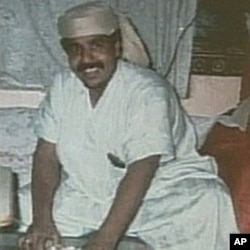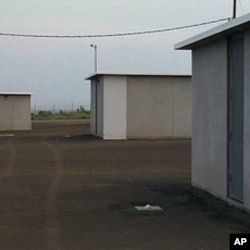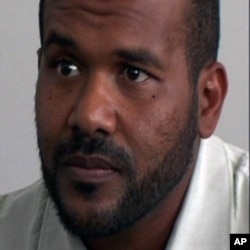"The Oath," a documentary by filmmaker Laura Poitras, opens a window into the world of al-Qaida, Osama Bin Laden, the detention center at Guantanamo Bay and the image of the United States in Yemen.
Shot in Yemen and Guantanamo, Cuba, the film won the award for best cinematography at the Sundance Film Festival and comes at a time of heightened interest in the Yemeni branch of al-Qaida.
In "The Oath," the man known as Abu Jandal appears troubled. He's a taxi driver in Sana'a, Yemen's capital, and he struggles to make a living.
Abu Jandal also obsesses about his brother-in-law, Salim Hamdan, who spent seven years in the US prison at Guantanamo Bay,Cuba. Abu Jandal shows his young son pictures of him and Salim Hamdan. He asks the little boy "Where is Uncle Salim?"
The boy shyly replies, "In Cuba." "What is he doing in Cuba?" Prods Abu Jandal. "He's imprisoned," replies the child.
"Who put him in prison?" Continues Abu Jandal. "America," responds the kid.
But Abu Jandal also says he feels responsible for Salim's fate. He got his brother-in-law to join al Qaida in 1996. At the time, Abu Jandal was Bin Laden's bodyguard but, he says, Salim was not a terrorist. Abu Jandal left Bin Laden in 2000, despite a loyalty oath, and he settled into family life. In an interview with the VOA, director Laura Poitras says Abu Jandal's and Salim Hamdan's relationship is about larger issues.
"It's this family drama that walks us through the history of 9/11, of Guantanamo of interrogation," says the filmmaker.
Hamdan was arrested in Afghanistan and was transferred to Guantanamo shortly after the September 11 attacks on the U.S. He remained there for seven years. Poitras doesn't show Hamdan's face. But his letters to his family speak of his torment.
"A month is like a year here. I have pains in my back and leg and I itch from lack of sunshine," Salim writes.
During an interview with VOA, Poitras was emotional about Salim's ordeal she said "Guantanamo is a nightmare. It's a national nightmare. It's unimaginable to me that Guantanamo is entering into its ninth year. I mean how is it possible that we 're holding people outside the law that have been charged with nothing!"
Hamdan's military defense lawyer Lt. Commander Brian Mizer, agrees. While in Yemen, Mizer spoke with relatives of Guantanamo detainees. He said "the use of coerced confessions is one of the fundamental problems of the military commissions. Americans and in particular the American government cannot understand how Bin Laden had farmers, had mechanics, had cooks. They see Hamdan next to Bin Laden and therefore he must be a terrorist."
In Yemen, Poitras focused on Abu Jandal. The man is complicated, deeply religious, and charismatic. He denounces terrorist acts that kill innocent civilians but he also feels torn about breaking his oath to Bin Laden. He says al-Qaida in Yemen has grown from a fringe group into a strong social movement. Poitras films Abu Jandal being interviewed by New York Times reporter Robert Worth.
Throught a translator Abu Jandal said "Yemen is a marketplace of ideologies. The problem with the new generation of al-Qaida is that they are not guided by al -Qaida's original goals. They believe they should attack any foreign target no matter what."
Abu Jandal is not appealing in the movie. He likes the spotlight. He despises America and its foreign policy but he also fears the new al-Qaida. Abdul Ghani Al-Iryani, a political analyst who advised Poitras, tells VOA he has similar fears. "The second generation of al-Qaida are much more dangerous than the older one. They came about because of the invasion of Iraq and they are very angry. They consider everybody to be the enemy including fellow Muslims and fellow Yemenis," says Al-Iryani.
FULL INTERVIEW WITH ABDUL GHANI AL-IRYANI
Full Interview Transcript: Abdul Ghani Al-Iryani
Poitras does not take sides. She says she tells it like it is. Her documentary "The Oath," links al-Qaida's growth in Yemen to anger at U.S. foreign policy in the Middle East and to the controversial detention of terror suspects at Guantanamo Bay.






